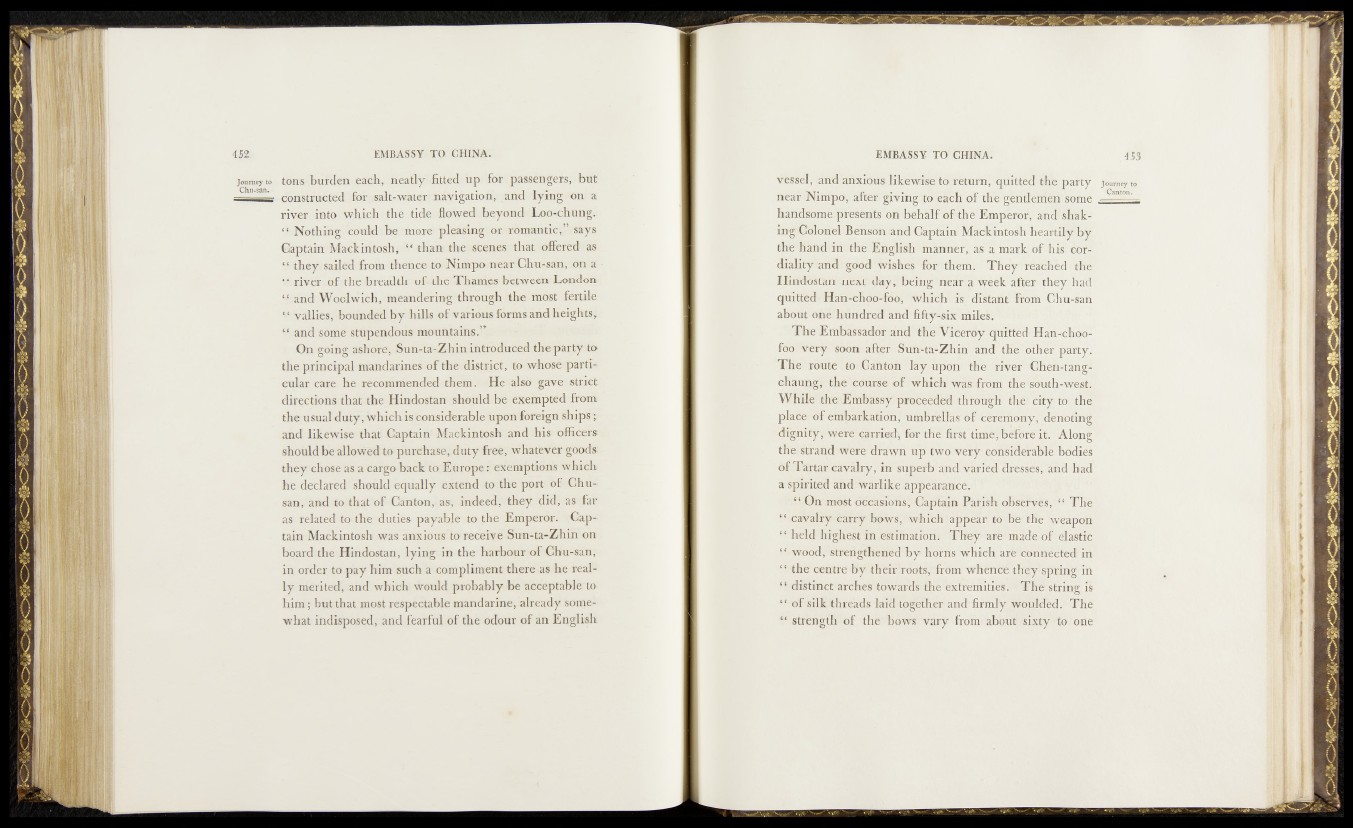
tons burden each, neatly fitted up for passengers, but
constructed for salt-water navigation, .and lying on a
river into which the tide lowed beyond Loo-chung.
“ Nothing could be more pleasing or romantic,” says
Captain Mackintosh, “ than the scenes that offered as
“ they sailed from thence to Nimpo neaT Chu-san, on a
“ river of the breadth of. the Thames between London
“ and Woolwich, meandering through the most fertile
^ vallies, bounded b y hills of various forms and heights*
“ and some stupendous mountains.”
On going ashore, Sun-ta-Zhin introduced the-party to
thoprincipal mandarines o f the disfe^et , to whose parti-
eular care he recommended them. He also gave strict
directions that the Hindostan should be exempted from
the;usual duty,whichis considerable upon foreign ships;
and likewise that Captain' Mackintosh and
should be allowed to purchase, duty free, whatevergoodss
they chose as a cargo back to Europe r exemptions which
he declared should equally extend to the port- ofi’JShu^"
san, and to that of Canton, as, -indeed, they did, as 'far
as related to the duties payable to the Emperor. Cap--
tain Mackintosh was anxious to receive Sun-ta-Zhin on
board the Hindustan, lying in the harbour of Chu-san,
in order to pay him such a compliment there as h$ really
merited, and which would probably be acceptable to
him; but that most respectable mandarine, already somewhat
indisposed, and fearful of the odour of an English
vessel, and anxious;likeysfse tcrreturn, quitted the party jsurhey.to.
near Nimpo, after giviit^to^êllh of ttóèï'gentlenien. some ■ Canton“_
handsome presents on behalf ofithe'Emperor, and shaking1
Colonel BénSob. and Captain Mackintosh heartilyf by
the hand ihothelEnglish maunh^-a^Ta markfofvhis* cordiality
and good wishes 'for them: - They r dabbed kliW
Hindostan next day, being near alv^eelo^fjfet! th^fihad
quitted Han-choó-foo, which? is distant from Chu-saii
about one hundred and fifty-six miles£%
The Embassador and the,-ViÊeVdy quitted Han^chóö-
foof very sobir after Sun-ta-Zhin and theroth&r party.
THe route to Canton river fChen-tangt
chaung, the course o f which wasifrêbb theiSouth-w.est
While the Embassy pröceédbd 'through mWcityf tot the
place“'ó f embarkatid^umbfélfas'óSteei'tlHi'&y, 'dönbdki^
dignity, were carried^ fortrW-ïïïst time, feÓfbplit. iAkmjp'
the strand ’Were drawn up two very iSëuiMerable 'bocff ëS
@f.Tattar;ea;valt^, in superb a<n# Varied’ ^treélp^aMid bad
a spirited and' Warlike appedra^fce.
■ “ On most oceasions' Captain Parish' oBserVês, “ Thé
“ cavalry carry bows, which appear" t0' b&^t*l»|%éiEbii
‘ ‘ held'-highest in .e'stifhatiöii. They - arfeHfefd'efqfi elastic?“ .,
I wood, strerigthened by hornsf^hfehiaredcOnri^eted in
“ the from whence th^ylspiin^ih
“ distinct arches towards thêOVfremities. * T h é string; is
“ of silk threads laid together*ahd'firmly woul’ded. The
“ strength of the" bows Vary froth1 abbudi sixty' to orie